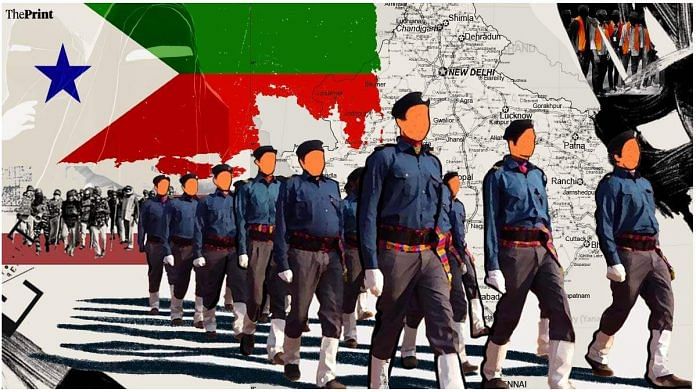Bengaluru/Kozhikode: With his silver hair, thick black-framed spectacles, and neatly tucked in half-sleeve shirt, former English literature professor P. Koya, 68, looks like the archetypal Kerala academician.
But, there is more to him than three decades of teaching students about Shakespeare. Koya is one of the founders of the Islamic outfit Popular Front of India (PFI) and a former member of the banned terrorist organisation Students’ Islamic Movement of India (SIMI).
Pulling up a plastic chair at his office at the Islamic Youth Centre in Kozhikode, Kerala, Koya complained that the “dangerous and destructive” combination of “religion and fascism” in India is responsible for the controversies surrounding the PFI. “We call it 56-inch fascism,” he said.
Ever since the hijab row broke out in Karnataka’s educational institutions, the PFI has been all over the news. The organisation and its affiliates have been accused of pulling the strings of the Muslim women’s protests over their right to wear a hijab and of fomenting communal unrest for political capital.
When a Bajrang Dal worker was stabbed to death last Sunday, the Vishva Hindu Parishad (VHP) and some BJP leaders were quick to blame the PFI.
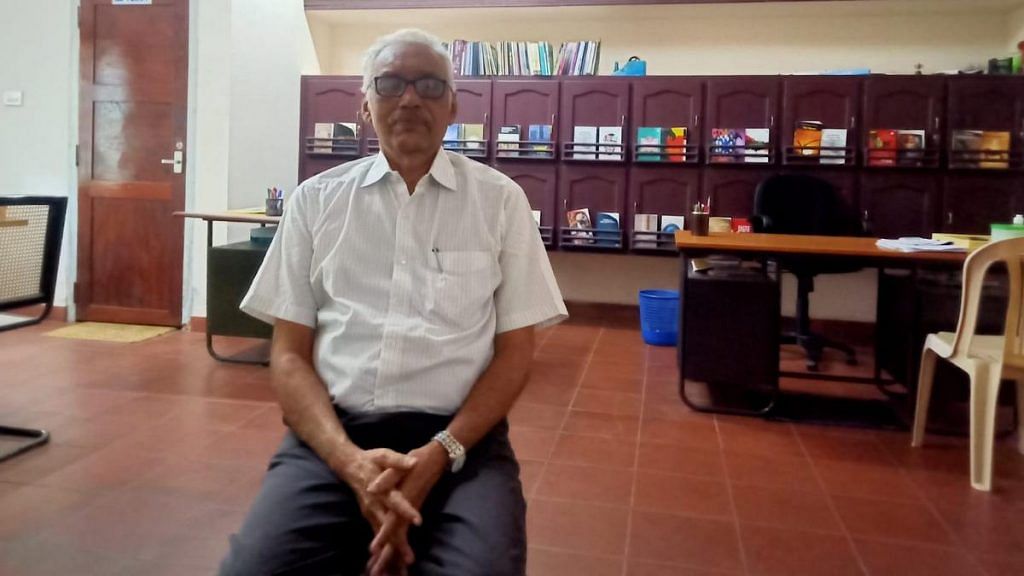
As a trend, though, this is not new. Allegations of radicalism, anti-government activities, communal trouble-making, “sedition”, and links with extremist organisations like the banned SIMI have dogged the PFI for as along as it has existed, but there has been a shift in the organisation’s response of late — in pitch, tone, and visibility.
Last Thursday, on ‘Popular Front Day’, it held a huge event in Murshidabad, West Bengal — in the presence of a Trinamool Congress MLA — where a PFI leader directly challenged the Rashtriya Swayamsevak Sangh (RSS) and called it a “cancer” that started the hijab “drama”.
On the same day, the PFI also took out a large rally in Kota, Rajasthan, leading the BJP to criticise the Congress government in the state for encouraging an “anti-national” organisation. There were marches in Kerala, the birthplace of the organisation, and smaller events in Tamil Nadu, Goa, Delhi, and Maharashtra too.
Flag Hoisting in Maharashtra #PopularFrontDay #SaveTheRepublic @PFI_Maharashtra pic.twitter.com/5HeAaWzTd4
— Popular Front of India (@PFIOfficial) February 17, 2022
Despite being almost perpetually under the scanner of investigative agencies, the PFI seems to be going from strength to strength and has a sizeable presence in not just Kerala and Karnataka but north India too.
Its affiliates have also upped their game. The PFI’s student wing, the Campus Front of India (CFI), holds sway in coastal Karnataka and also led hijab protests in Delhi, while its political arm, the Social Democratic Party of India (SDPI), has managed to win some local elections in Karnataka.
Expectedly, the PFI’s growing influence has renewed calls for a ban on it, including from Assam Chief Minister Himanta Biswa Sarma, Mysuru’s BJP MP Pratap Simha, and Hindutva organisations like the Sri Ram Sene over the last 10 days alone.
The PFI, on its part, claims that it is merely standing up against Hindutva forces and is the victim of a witch-hunt.
Amid this battle of conflicting narratives, ThePrint spoke to investigating officers as well as PFI leaders to unpack the organisation’s antecedents, the cases and controversies it has been named in, as well as its remarkable growth despite the cloud of suspicion that it cannot shake off, even though few charges seem to stick.
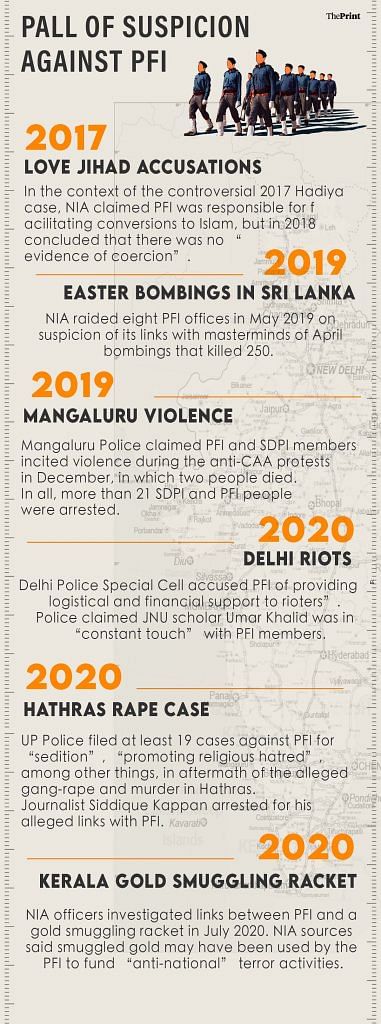
Also Read: Viral photos, bruised egos, radical student groups: Inside story of Karnataka’s hijab crisis
Why the PFI is so ‘notorious’
The PFI calls itself a “neo-social movement” with a vision to empower all marginalised sections in India, but various investigative agencies — from the National Investigation Agency (NIA) and the Central Bureau of Investigation (CBI) to the Enforcement Directorate (ED) and state police units — have been hot on its heels for years in cases spanning the length of the country.
These include, among other things, allegations of involvement in a gold smuggling racket in Kerala, marriage for conversion in Karnataka and Kerala, sponsoring anti-CAA riots in Delhi, and committing “sedition”, and instigating communal violence in Uttar Pradesh.
The NIA is currently investigating over 100 PFI members in various cases across India, and the ED is probing the organisation for allegedly funding the 2020 riots in Delhi as well as the protests against the Citizenship Amendment Act (CAA).
The Delhi Police Special Cell, too, is investigating the PFI’s role in allegedly “providing logistics” for the 2020 Delhi riots.
With the allegations of hatching conspiracies and financing riots racking up, there have been several calls for a ban on the PFI.
In 2019, the Uttar Pradesh government sought to outlaw the PFI for allegedly provoking anti-CAA riots. The NIA, too, sent a detailed report to the Ministry of Home Affairs (MHA) in 2017, wanting a ban on the organisation.
The agency claimed that the PFI was a “threat to national security” and was using outfits like the Sathya Sarani in Malappuram to carry out “forced conversions”. The NIA also alleged that the organisation was involved in terror attack plots and bomb-making.
The NIA report further claimed that the PFI was operational in 23 states and was suspected of running institutes where “young people are indoctrinated” and recruiting volunteers trained in making crude bombs.
The cases that made to the NIA’s dossier were a 2010 axe attack on Professor T.J. Joseph, in Kerala’s Idukki district, in which his hand was chopped off, the murder of an RSS leader, R. Rudresh, in Bengaluru, the setting up of operations in south India by the Islamic State Al-Hindi module, and the recovery of bombs, IEDs, and swords from PFI bases in Kannur in 2010.
The agency also cited the 2016 conviction of 21 PFI members by a special NIA court in Kerala for organising a terror camp in Kannur in 2013.
Speaking to ThePrint, a source in the NIA said, “We had sought a ban based on the dossier that we have of the PFI. The request is pending with the MHA.”
In April last year, the central government told the Supreme Court that it was “in the process” of banning the PFI, but that still hasn’t happened.
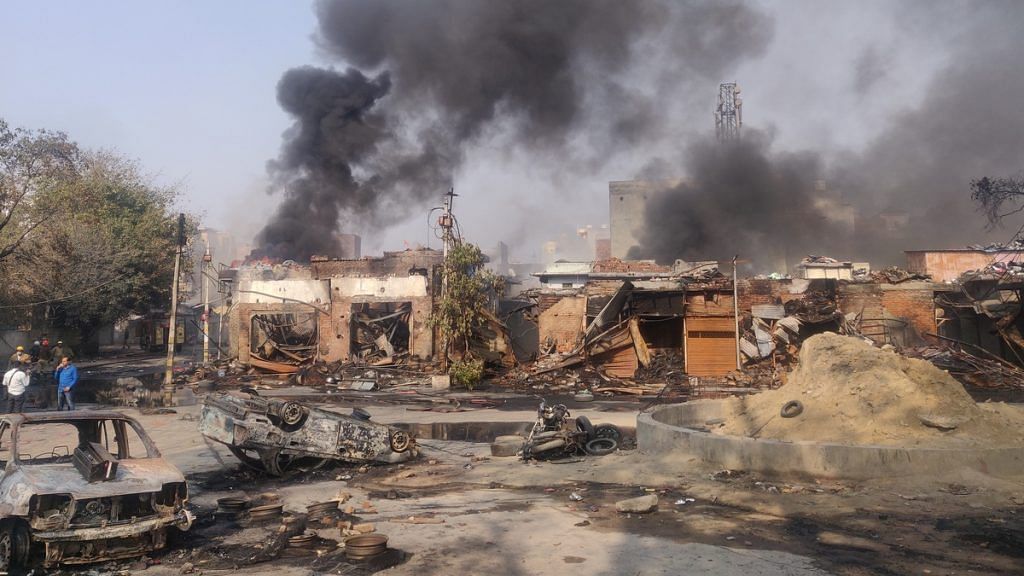
PFI chairman O.M.A. Salam, whom ThePrint met in Kozhikode, said the accusations of political violence and various investigations for terror links were “engineered” to discredit it.
“Naturally, the RSS’s network, with its strong influence on government machinery and the media, peddles negative propaganda against us. Their voice and narrative may be strong today but someday it will change. There is always light at the end of the dark tunnel,” Salam said as he sat in his second-floor office while at least two dozen people waited patiently outside to meet him.
‘Unapologetic Muslims’ or terror supporters?
Anis Ahmed, national general secretary of the PFI, accepted that members of the organisation are accused in dozens of cases across the country, but said these were “individual crimes” that were pinned unfairly on the organisation.
“We have condemned crimes our members were involved in too like the hand-chopping case from Kerala [of a Christian professor for alleged blasphemy]. We don’t condone it,” he said, adding that the “radical” tag was misplaced.
“The moment you are an unapologetic Muslim, you are branded a radical. We are assertive in our approach. Would it be possible for any organisation in India to function if it had terror links? That is proof enough,” Ahmed added.
However, one of the earliest accusations against the PFI is that the organisation is simply a rebranding of the outlawed SIMI, which has been involved in several terror attacks, including the series of blasts in Mumbai between 2002 and 2003.
Officially, the Popular Front of India came into being in 2006 with the merging of three outfits in south India: the Kerala-based National Development Front (NDF), the Karnataka Forum for Dignity (KFD), and the Manitha Neethi Parasai (MNP) in Tamil Nadu.
But, several founder-members of the PFI were SIMI leaders, including former PFI chairman and now vice-chairman E.M. Abdul Rahiman (general secretary of SIMI between 1982 and 1993), SDPI president E. Aboobacker (Kerala state president of SIMI from 1982 to 1984), and Professor P. Koya, national executive member and one of the tallest leaders of the PFI, who was also a founding member of both SIMI and the NDF.
When asked about his background, Koya told ThePrint that he quit SIMI in 1982 and founded the NDF about a decade later, in 1993, as reaction to the “surge of Hindutva fascism” in the late 1980s and early 1990s.
“The culmination of this surge of fascism was in 1992 when the Babri Masjid was destroyed by a gang led by L.K. Advani and others. It became very clear that traditional Muslim outfits weren’t able to articulate the concerns of the Muslim community,” Koya said.
Harish Pandey, Deputy Commissioner of Police (DCP), Bengaluru South, has a somewhat different take on the PFI’s antecedents, based on his observations while investigating cases linked to the outfit.
“The push to build a radical Islamic outfit seems to have gained momentum in the early 2000s. Such radicalised cadres left SIMI en masse after it was banned [in 2001] and went underground for some time, but re-emerged as PFI,” Pandey said.
PFI leaders, however, reject this claim and say their predecessor organisation, the NDF, came into being in 1993, much before SIMI was banned.
Koya emphasised that the NDF and SIMI were parallel organisations for 10 years before the latter was banned but their ideologies were different. “SIMI said Islam was the only solution to India’s problem but we hold that India is a pluralistic country with many religions. We never conformed to SIMI’s idea,” he claimed.
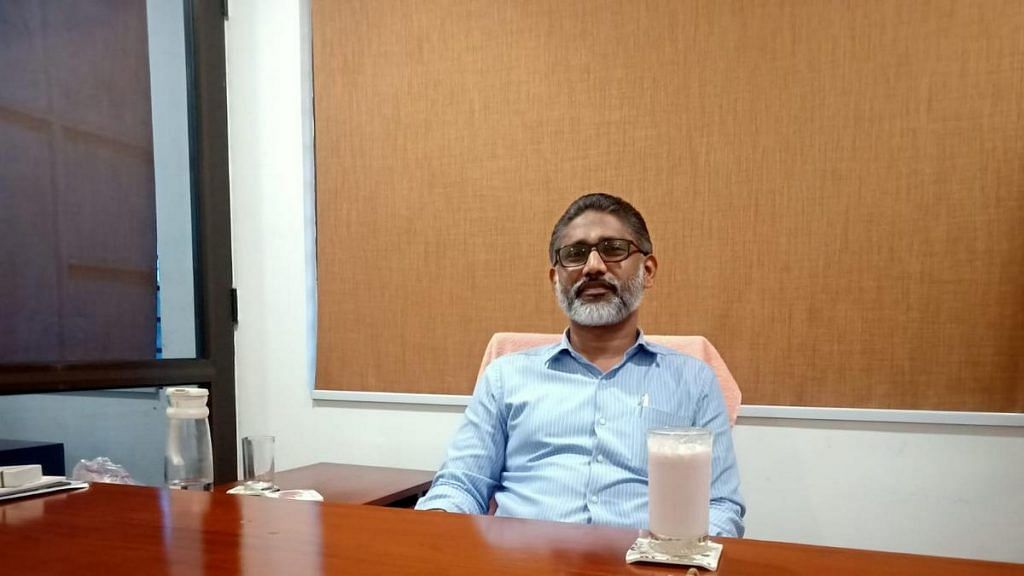
Other PFI leaders like Anis Ahmed and O.M.A. Salam added that there was nothing inherently wrong in some members having a past in SIMI.
“Simply because a few former members of SIMI are also senior leaders of PFI it doesn’t become a regrouping of SIMI,” Anis Ahmed, a software engineer by training and a member of the KFD before the PFI was formed, said.
According to Ahmed, the PFI had many members that had started out in other political organisations, including the Congress, JD(S), CPI(M), and Muslim League, and that focusing on only those with SIMI roots was “deliberate mischief”.
The PFI has attracted a number of organisations into its fold. In 2009, several organisations across the country — including the Citizen’s Forum in Goa, the Community Social and Educational Society in Rajasthan, the Nagarik Adhikar Suraksha Samiti in West Bengal, the Lilong Social Forum in Manipur, and the Association of Social Justice in Andhra Pradesh — merged with it.
In 2022, the PFI is witnessing another surge in its growth, its leaders say.
Growth of PFI: Muslim ‘empowerment’ vs ‘criminal heft’
There are currently about 4 lakh PFI cadres across India and these numbers are growing rapidly, according to PFI chairman O.M.A. Salam. The PFI, he added, also has supporters and sympathisers “running into millions” who participate in “programmes” but shy away from membership because of the organisation being “constantly on the radar”.
“Our leaders currently are largely from Kerala, Karnataka, and Tamil Nadu but we are growing as an organisation. Now we have cadres in the western, eastern, and northern states of India too and soon there will be leadership from there,” Salam said.
That this is plausible is borne out by the large turnout for the organisation’s “unity marches” on 17 February in Rajasthan and West Bengal. Another metric of “influence” could be the number of cases filed against PFI members over the last few years in Uttar Pradesh and Delhi.
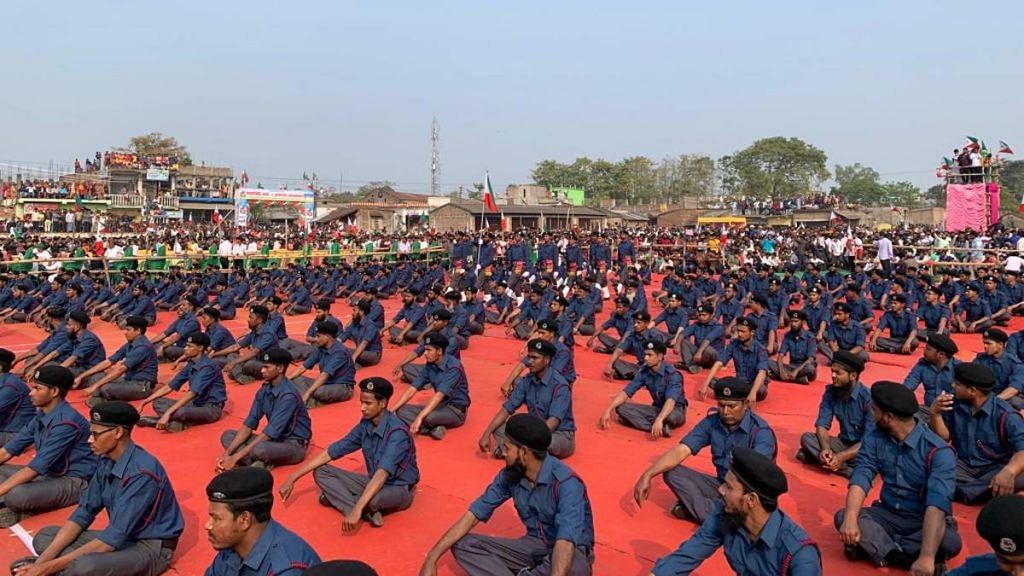
While the PFI credits its rising popularity to its efforts to “empower” Muslims and other marginalised sections, investigative authorities say they see a pattern of criminal activity and illegal funding.
According to DCP Harish Pandey, the organisation’s growth in Karnataka began in areas where there is a sizeable minority population, especially Ullal, Bantwal in Dakshin Kannada, Hassan, and Chikkamagaluru. “Murders and violence started over interfaith relationships,” Pandey said, as the PFI gained in influence.
The police officer added that the kidnap and murder of two college students from Hunsur in 2011 revealed a motive for PFI members’ involvement in crimes like extortion, dacoity, kidnapping, and murder: to raise funds for the organisation.
Apart from this, the DCP said, members of the outfit were also believed to be involved in crimes over ideology and politics. In 2019, members of the PFI and its political arm SDPI were implicated in a homicidal attack on Congress MLA Tanveer Sait as well, Pandey added.
According to him, crimes like these are often perpetrated by PFI “activists” who are not formal members of the organisation.
“There is a clear distinction between card-carrying members and non-registered activists,” Pandey explained. The latter, he said, often carry out crimes but are difficult to link back to the PFI.
“There is a trend. Those that carry out crimes hail from uneducated, poor backgrounds. Many have a history of criminal activities. Such persons are actively recruited,” he said.
The police officer further claimed that the one of the PFI’s “strategies” is to provide legal assistance to poor Muslim youth who are booked for crimes but can’t afford a lawyer.
“These youngsters are looked at as potential recruits. The PFI pays their legal fees, takes care of their families, and gains their loyalty,” Pandey said. He cited the example of the legal representation given to those arrested for Bengaluru’s DJ Halli riots in August last year. In this case, the NIA charge-sheeted at least 47 members of the PFI and SDPI.
However, what investigation agencies deem as a ploy to gain loyal cadres, PFI describes as a service to disadvantaged Muslims.
“Fake cases against Muslims are commonplace. In most lynching incidents [against Muslims], culprits are acquitted because the victims don’t have access to legal aid. The community is not aware of legal process. We have a strong legal team that helps them fight cases,” Anis Ahmed said.
According to him, the PFI’s legal interventions have brought justice in many cases, including in the Hadiya religious conversion controversy, the Muzaffarnagar riots, and the lynching of Tabrez Ansari in Jharkhand.
“From getting FIRs registered under the right sections to following up with investigating officers, drafting appeals, preparing legal documents, and motivating victim families to keep up the legal battle, the PFI’s huge legal team does a lot of backend work,” Ahmed claimed, adding that the organisation is hoping to groom the next generation of legal and media minds by sponsoring students in these fields.
The PFI also plans to start programmes to prevent youths from dropping out of school and to “adopt” backward villages.
“We are looking to develop the most backward villages in north India, which incidentally are also Muslim-dominated. This is not a coincidence. This is the result of systematic oppression of minorities to keep them marginalised,” O.M.A. Salam told ThePrint, adding that the PFI is looking to eliminate this inequality.
Social crusading aside, another area where the organisation is expending efforts is in cementing its political legitimacy.
PFI and politics
The PFI is frequently accused of riling up the Muslim community over religion and politics, but the organisation maintains that neither is its main concern. “Religion is not our business. We are not a political party but we did look for political collaboration with other marginalised people like Dalits,” Koya said.
However, the PFI’s political wing SDPI has made some inroads in local elections.
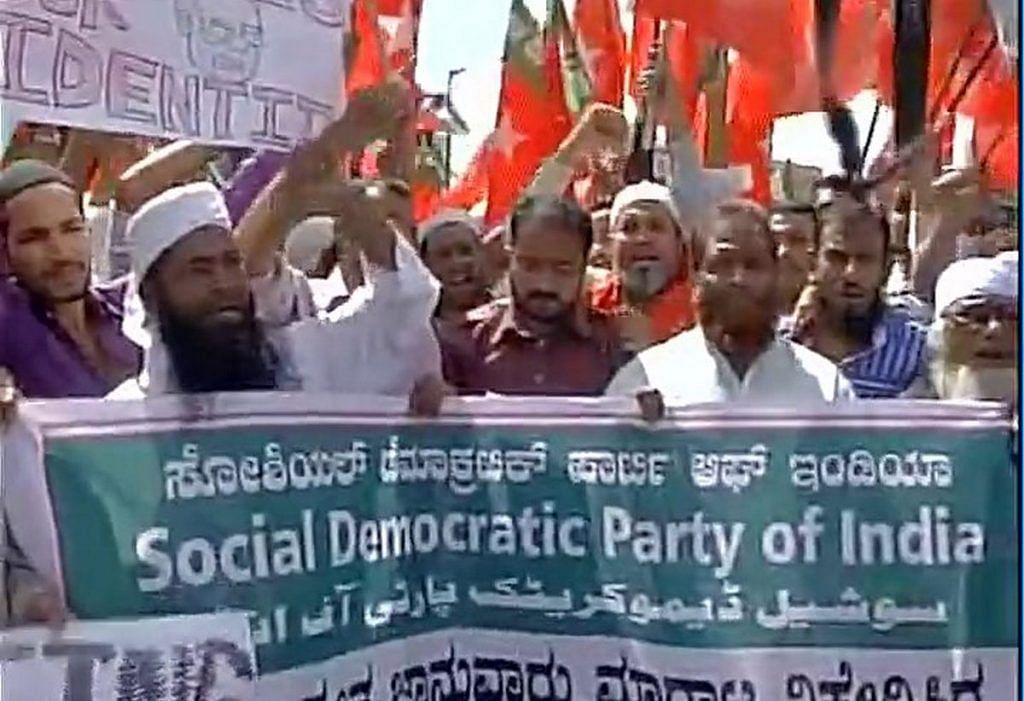
Last December, the SDPI won six seats in Karnataka’s urban local body elections. Of the six, three were in Kaup in Udupi district, and one each in Vittla and Kotekar in Dakshina Kannada district — all coastal regions with a sizeable Muslim population. The remaining seat was won by a Dalit candidate fielded by the party in Chikkamagaluru.
“SDPI wasn’t started by PFI but we held a national political conference in 2009. The outcome of that conference was SDPI,” Anis Ahmed told The Print.
Political analysts in Kerala are not convinced with that version of the SDPI’s beginnings.
“The PFI was an offshoot of the radical NDF. After People’s Democratic Party (Kerala-based PDP, different from its J&K namesake) leader Abdul Nasser Madani was arrested [in connection with terror attacks], the PDP turned into SDPI. Their politics is as communal as the RSS’s is,” Paul Zacharia, a Malayalam writer and political columnist, said.
While the SDPI looks to gain electoral victories, the PFI’s student wing — Campus Front of India (CFI) — is putting up a battle of cadreship against the ABVP (RSS’s student wing) in Karnataka, where it has considerably more sway than the Congress’s student arm in certain pockets and has played an important role in keeping up the momentum of the hijab protests.
There are some parallels and links between the SDPI and another Muslim-focused party — the Hyderabad-based All India Majlis-e-Ittehadul Muslimeen (AIMIM), led by Asaduddin Owaisi.
Like the AIMIM, the SDPI, too, has been accused by the Congress of having a tacit understanding with the BJP, especially as elections close in, to whip up polarisation.
Leaders of the PFI, meanwhile, openly profess their soft corner for the AIMIM. “Just like we are accused of a host of things, AIMIM too faces many allegations, but unless there is evidence to back these allegations, one can’t know for sure,” Anis Ahmed said.
After the CAA-related violence in Murshidabad, West Bengal, in December 2019, central intelligence reports claimed to have evidence that the AIMIM had backed the PFI in planning public meetings there on 5 January 2020. The Trinamool Congress (TMC) scuppered the plan to hold the meetings, but two years later, Manirul Islam, TMC MLA from Farakka, stood side by side with PFI leaders in Murshirabad earlier this month, “overwhelmed” by the gathering.
Also Read: The politics behind Karnataka’s hijab row: Sliding Congress, rising SDPI, combative BJP
Who funds the PFI?
The Enforcement Directorate subjected office-bearers of the PFI to multiple raids in 2020 following allegations that the organisation funded anti-CAA and NRC (National Register of Citizens) protests across the country.
“Thanks to an ED raid, I found my daughter’s birth certificate that had gone missing for two years,” Anis Ahmed quipped, adding that the ED found nothing incriminating against him or other leaders of the PFI.
The Islamic outfit has been repeatedly accused of receiving funds from foreign entities, but says that donations from ordinary Muslims keep its engines running.
“On a single Friday evening, in a matter of 15 minutes PFI raised Rs 80 lakh to fight the Hadiya case just by standing outside mosques,” Ahmed said. The organisation has two kinds of donation drives — one an annual donation drive during the month of Ramzan and another for targeted schemes like scholarships and flagship programmes, he added.
Some funds also go towards controversial training camps for new cadres.
Training and grooming camps may have a dark side, investigators say
Depending on who you speak to, PFI camps sound either like management retreats or terror training modules.
According to PFI national general secretary Anis Ahmed, all new cadres must follow a process, starting with a one-day orientation training that includes classes on the history of the organisation, its vision, mission, and intentions. “We inculcate social values too. No member is allowed to take dowry. No member can do any illegal business, including cryptocurrencies,” Ahmed told The Print.
After six months of joining, new recruits attend a five-day leadership training programme that includes lessons on policy, constitutional and legal awareness, as well as “personality development” and organisational management.
“We have a team of trainers for personality development. There are also management classes… on how to organise and mobilise people, how to conduct programmes, gatherings etc. We then identify orators, train them in modules for public speaking. There are separate modules for physical education like yoga,” Anis Ahmed said.
Investigative agencies, however, have claimed that the various camps passed off as “classes” by the PFI are training grounds for extremist activities.
The most glaring example is the 2013 Narath weapons seizure in Kannur. While the NIA alleged that PFI members were being trained in use of weapons and crude bombs, the organisation insisted they were participating in a yoga camp. In 2016, a court convicted 21 alleged PFI and SDPI activists in this case for possession of arms and explosives, criminal conspiracy, and organising a terror camp, among other charges.
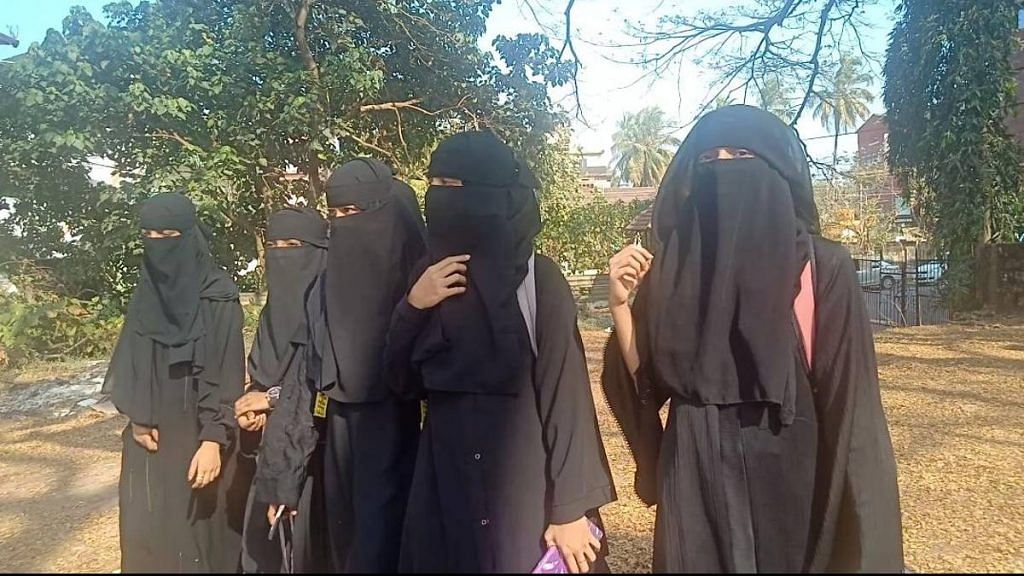
What has prevented a ban all this time?
The PFI attributes a ban never materialising to the “unsoundness” of the various charges against it.
Police investigators, however, believe that the PFI has escaped the net partly because of lack of conclusive evidence and partly due to legal delays and loopholes.
A director general-rank officer from Karnataka complained that the judicial process often hindered timely action.
“Our legal system takes forever for even the trial to begin. Even after it does, the judicial system stretches it over long periods of time… If a priority terror attack case can take 18 years for a verdict, one can imagine how long crimes like murder, political clashes etc will take before reaching finality,” he said.
According to this officer, the PFI started “popping up on the radar of the Karnataka Police” for various crimes well over a decade ago, “but one can recommend action against an organisation only if cases they are accused of are tried and legal finality is achieved”.
Another problem, the police officer noted, was the lack of a good witness protection system. “This allows intimidation leading to witnesses turning hostile, eventually making convictions challenge,” he said.
Anis Ahmed, meanwhile, claimed that rather than engaging in illegal activities, the PFI was fighting for “the Indian Constitution to be implemented in spirit, which it currently is not”.
Ahmed brought up the case of Abdul Nasser Madani, leader of Kerala’s Peoples Democratic Party (PDP) and an accused in the 2008 Bangalore serial blasts, who allegedly had links with the terrorist outfit Lashkar-e-Taiba.
“Mohan Bhagwat also had ties to Aseemanand [a now-acquitted accused in the 2007 Samjhauta Express bombing]. But nobody has the guts to treat Bhagwat the way they did Madani. This bias is visible and is a product of majoritarian fascism,” Ahmed alleged.
(Edited by Asavari Singh)
Also Read: RSS a ‘cancer’, created hijab ‘drama’, says PFI in grand Bengal meet where TMC MLA shares stage


